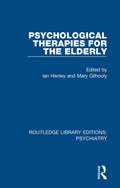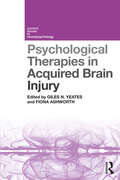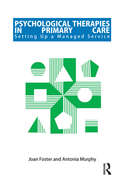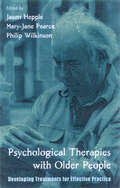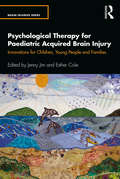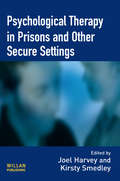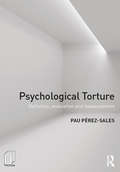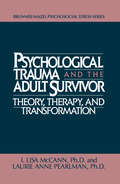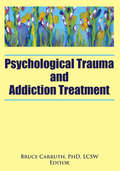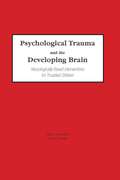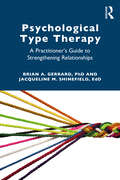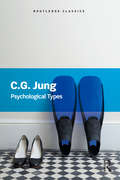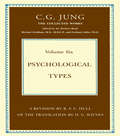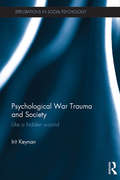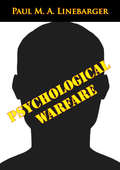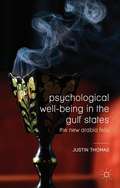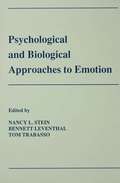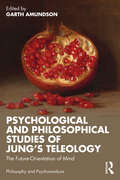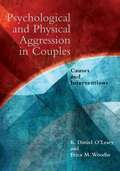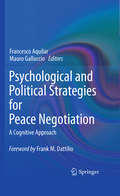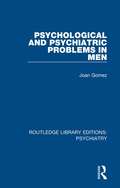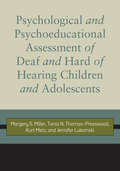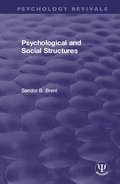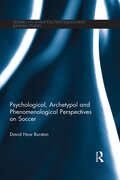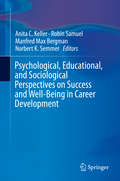- Table View
- List View
Psychological Therapies for the Elderly (Routledge Library Editions: Psychiatry #11)
by Ian Hanley Mary GilhoolyPrior to publication, it had only recently been appreciated that psychology had a great deal to offer in therapeutic terms to a wide range of patients, and was not merely concerned with assessing and identifying problems. This is particularly so with the elderly where physical and mental problems and multiple pathology are compounded, and where psychological aspects of the quality of life are so important. The focus of this book, originally published in 1986, is on therapeutic approaches and the effective implementation of services. While the book is aimed particularly at clinical psychologists, it will also be of great interest to medical, nursing or occupational therapy staff working with elderly people.
Psychological Therapies in Acquired Brain Injury (Current Issues in Neuropsychology)
by Fiona Ashworth Giles N. YeatesThe psychological impact of an acquired brain injury (ABI) can be devastating for both the person involved and their family. This book describes the different types of psychological therapies used to ameliorate psychological distress following ABI. Each chapter presents a new therapeutic approach by experts in the area. Readers will learn about the key principles and techniques of the therapy alongside its application to a specific case following ABI. In addition, readers will gain insight into which approach may be most beneficial to whom as well as those where there may be additional challenges. Covering a wide array of psychological therapies, samples range from more historically traditional approaches to those more recently developed. Psychological Therapies in Acquired Brain Injury will be of great interest to clinicians and researchers working in brain injury rehabilitation, as well as practitioners, researchers and students of psychology, neuropsychology and rehabilitation.
Psychological Therapies in Primary Care: Setting up a Managed Service
by Antonia Murphy Joan FosterThis book deals with effective organization and management of counselling services—a clinical service. It is intended for primary care trust chief executives and directors and commissioners and providers of national health service counselling, pyschological therapy services.
Psychological Therapies with Older People: Developing Treatments for Effective Practice
by Philip Wilkinson Jane Pearce Jason HeppleSigmund Freud believed that psychoanalysis (and other forms of therapy) was not suitable for people over 50 years of age. In Psychological Therapies with Older People, the authors demonstrate the value of a range of psychological interventions with older people, showing that it is 'not too late' to help.With an emphasis on practical application, and using a wide range of clinical examples, the authors describe the therapies most likely to be useful in a mental health service for older people, and consider the implications for service provision. Therapies covered include:* interpersonal therapy (IPT)* cognitive behavioural therapy (CBT)* psychodynamic and systemic therapy* cognitive analytical therapy (CAT).For each treatment, the historical background and basic theoretical model is summarised before giving a description of the therapy in practice. The authors also discuss the theory of the use of evidence of efficacy and effectiveness in choosing therapeutic interventions, summarising currently available data. Psychological Therapies with Older People will be an invaluable resource for psychiatrists and psychologists working with older people, as well as to GPs, nurses and occupational therapists.
Psychological Therapy for Paediatric Acquired Brain Injury: Innovations for Children, Young People and Families (The Brain Injuries Series)
by Jenny Jim Esther ColeChildren, young people and families living with an acquired brain injury (ABI), whether through accident, illness, injury or abuse, are rarely offered psychological therapy, and yet the benefits of such interventions can be profound. This important new book, providing a selection of practice examples and insights from frontline practitioners, will be essential reading for any paediatric therapist or clinician. Beginning with a "life story" of the brain where emphasis is placed on how brain development is fundamentally related to its environment, the book offers key background knowledge before showcasing the core topics of assessment, psychological formulation and intervention. It features a range of therapeutic models, includes direct and indirect work, group work and family therapy, with settings varying from inpatient neurorehabilitation to community work and the transition to education. The long-term needs of those in the criminal justice system are also addressed. The closing chapters focus on the debate around effective outcome measurement and outline a vision for better services. Elevating the voices of our children, young people and families living with ABI, this pioneering book will provide practitioners with the confidence to work collaboratively across a range of children and young people with disorders of consciousness or communication to those with behaviour that challenges others to manage. It offers new ways to understand both children’s pasts and their futures, and will be essential reading for anyone in the field.
Psychological Therapy in Prisons and Other Settings
by Joel Harvey Kirsty SmedleyThis book examines a range of therapeutic approaches used in prisons and other secure settings and explores the challenges in such work. The approaches include Cognitive-Behavioural Therapy (CBT), Cognitive-Analytic Therapy (CAT), Attachment-Based Psychodynamic Psychotherapy and Systemic Psychotherapy. It provides insights into debates about providing therapy in prisons and other secure settings and discusses specific topics such as mental health in-reach teams, working with women in prison, therapy within therapeutic communities and therapy with black and minority ethnic groups. This book addresses developments in mental healthcare by the National Health Service (NHS) within prisons and on-going policy developments which aim to improve access to psychological therapies for prisoners. The contributors draw on experience both in clinical psychology and forensic psychology, as well as psychotherapy and criminology. They draw on experience too in a range of environments, including juvenile and young offender establishments, local prisons and dispersal prisons. Psychological Therapy in Prisons and Other Secure Settings will be essential reading for people who work to improve the psychological wellbeing of individuals in prisons and other secure settings.
Psychological Torture: Definition, Evaluation and Measurement
by Pau Perez SalesSadly, it is highly likely that psychological torture is committed by governments worldwide and yet, notwithstanding the serious moral questions that this disturbing and elusive concept raises, and research in the area so limited, there is no operational or legal definition. This pioneering new book provides the first scientific definition and instrument to measure what it means to be tortured psychologically, as well as how allegations of psychological torture can be judged. Ground in cross-disciplinary research across psychology, anthropology, ethics, philosophy, law and medicine, the book is a tour de force which analyses the legal framework in which psychological torture can exist, the harrowing effects it can have on those who have experienced it, and the motivations and identities of those who perpetrate it. Integrating the voices both of those who have experienced torture as well as those who have committed it, the book defines what we mean by psychological torture, its aims and effects, as well as the moral and ethical debates in which it operates. Finally, the book builds on the Istanbul Protocol to provide a comprehensive new framework, including practical scales, that enables us to accurately measure psychological torture for the first time. This is an important and much-needed overview and analysis of an issue that many governments have sought to sweep under the carpet. Its accessibility and range of coverage make it essential reading not only for psychologists and psychiatrists interested in this field, but also human rights organizations, lawyers and the wider international community.
Psychological Trauma And Adult Survivor Theory: Therapy And Transformation
by Laurie Anne Pearlman Lisa McCannFirst published in 1991. Routledge is an imprint of Taylor & Francis, an informa company.
Psychological Trauma and Addiction Treatment
by Bruce CarruthImportant reading for current and future addictions treatment clinicians-this book synthesizes and integrates the expanding body of knowledge about combined trauma/addiction treatment to specifically address the needs of clinicians in addiction treatment environmentsHere, in a single source, is an essential overview of trauma treatment for people in addiction treatment settings. Psychological Trauma and Addiction Treatment presents specific methodologies and techniques for clients in inpatient and outpatient addiction/mental health settings. The contributors-leading clinicians and researchers in the field-provide a comprehensive set of scientific treatment approaches addressing a broad spectrum of trauma disorders.Psychological Trauma and Addiction Treatment brings you up-to-date, authoritative coverage of: the dynamics of co-occurring psychological trauma and addiction all of the primary treatment frameworks currently utilized in trauma treatment treatment frameworks that take gender into account cognitive therapies in treating these co-occurring disorders the role of psychodynamic psychotherapies in treatment attachment disorders and their relation to trauma and addiction treatment EMDR as a treatment for traumatized addicts the psychoneurology of trauma and the implications of psychoneurology in addictions and trauma treatment how self-help groups can contribute to and limit recovery for psychologically traumatized clients forgiveness therapy as an adjunct to trauma treatment counselor self-care for those who work with this client populationUltimately, this is a book of hope. Every author in this text has a firm belief that people with co-occurring trauma and addiction can recover, can maintain quality relationships, can confront life&’s challenges as they arise, and can be happy and fulfilled. Psychological Trauma and Addiction Treatment is designed as essential reading for entry-level and experienced addiction counselors, social workers, professional counselors, psychologists, and others working in the trauma treatment field.
Psychological Trauma and the Developing Brain: Neurologically Based Interventions for Troubled Children
by Phyllis Stien Joshua C KendallExplore interventions and treatment methods designed to help curb the alarming trend toward violence in today's youth! Written in jargon-free lucid prose, Psychological Trauma and the Developing Brain: Neurologically Based Interventions for Troubled Children specifically shows how positive early experiences enhance brain development and how traumatic life experiences, especially child abuse and neglect, can affect a child's brain and behavior. Through carefully selected case studies, the book offers basic principles of treatment and a broad range of interventions that target the multiple symptoms and problems seen in children with a history of childhood trauma. Offering a new psychobiological model of child development, this book incorporates the influence of both genes and the environment and conceptualizes normal and pathological development in terms of common underlying processes. For readers concerned with promoting healthy development in children and helping children recover from childhood trauma, this engagingly written book describes exactly how a child's social/interpersonal environment can positively or negatively influence brain development. Throughout the book, the authors highlight the interrelationship between neurobiology and psychology. They present basic information about brain development and organization, describe exactly what is going on inside the brain at each stage of development, and illustrate these concepts through a detailed case study of a preschooler with severe problems in communicating and relating. They discuss the pernicious effects that traumatic stress has on brain and behavior, differentiating between simple and complex PTSD, and review the specific brain impairments currently attributed to a childhood history of maltreatment. Using their unique psychobiological perspective and illustrative case studies, the authors evaluate the principles and strategies of treatment, showing how relationships and experiences can mitigate the effects childhood trauma. After fleshing out the shocking cost to society of child maltreatment, the authors offer broad policy prescriptions that promote healthy development, including basic strategies for prevention and early intervention. Psychological Trauma and the Developing Brain: Neurologically Based Interventions for Troubled Children will show you: how interpersonal experience shapes brain development what is going on in the brain during the critical first six years how therapeutic relationships and interpersonal experience can promote emotional and cognitive development how childhood maltreatment can damage the brain and impair the developing mind what types of experiences and therapeutic strategies can mitigate the effects of childhood trauma what policy prescriptions, programs, and early intervention strategies can be implemented to promote healthy development
Psychological Type Therapy: A Practitioner’s Guide to Strengthening Relationships
by Brian A. Gerrard Jacqueline ShinefieldThis book uses psychological type as a model for organizing mental health interventions, including assessing how a client’s personality is affected within a specific relationship using the Psychological Type Relationship Inventory and the Psychological Type Relationship Scale. By examining each psychological type characteristic, the book demonstrates how to help a client overcome a psychological type challenge by using techniques drawn from cognitive-behavioral, humanistic, and family therapy approaches. Over 20 techniques are described in explicit how-to format and chapters show the reader how to assess both positive personality characteristics as well as negative or challenging personality characteristics in developing therapy plans. The interdisciplinary nature of the text benefits a wide spectrum of mental health practitioners who are interested in incorporating personality into their case conceptualizations to develop more effective interventions in relationship therapy.
Psychological Types (Routledge Classics)
by Carl JungPsychological Types is one of Jung's most important and famous works. First published in English by Routledge in the early 1920s it appeared after Jung's so-called fallow period, during which he published little, and it is perhaps the first significant book to appear after his own confrontation with the unconscious. It is the book that introduced the world to the terms 'extravert' and 'introvert'. Though very much associated with the unconscious, in Psychological Types Jung shows himself to be a supreme theorist of the conscious. In putting forward his system of psychological types Jung provides a means for understanding ourselves and the world around us: our different patterns of behaviour, our relationships, marriage, national and international conflict, organizational functioning. This Routledge Classics edition includes a new foreword by John Beebe.
Psychological Types: The Correspondence Of C. G. Jung And Hans Schmid-guisan, 1915-1916 (Collected Works of C.G. Jung #8)
by C.G. JungPsychological Types is one of Jung's most important and most famous works. First published by Routledge (Kegan Paul) in the early 1920s it appeared after Jung's so-called fallow period, during which he published little, and it is perhaps the first significant book to appear after his own confrontation with the unconscious. It is the book that introduced the world to the terms 'extravert' and 'introvert'. Though very much associated with the unconscious, in Psychological Types Jung shows himself to be a supreme theorist of the conscious. In putting forward his system of psychological types Jung provides a means for understanding ourselves and the world around us: our different patterns of behaviour, our relationships, marriage, national and international conflict, organizational functioning. Appearing in paperback for the first time this central volume from Jung's Collected Works will be essential to anyone requiring a proper understanding of Jung's psychology.
Psychological War Trauma and Society: Like a hidden wound (Explorations in Social Psychology)
by Irit KeynanThis book explores the psychological trauma affecting soldiers and civilians who have encountered the violence of war or terrorism, arguing that the enigmas surrounding war trauma are rooted in culture, collective memory and social norms. Focusing primarily on a large-scale sociological study in Israel, chapters detail the ideological, political, historical and economic factors that shape the multifaceted connection between individual and collective trauma, probing the exterior layers of Israeli society and exposing the complex relationship between society and emotionally scarred individuals everywhere. Divided into three main parts, particular attention is paid to the treatment of soldiers and civilians, and the tension between the medical and societal approaches to PTSD, shedding light on the intricate relationships between war trauma and society worldwide. Part 1 looks at traumatized soldiers and the changing attitudes towards CSR and PTSD; Part 2 explores civilian trauma and shock, including the first published research on the implications of war trauma in Israeli Arab society; and Part 3 analyses the deficiencies and contradictions in current international definitions and discourses of trauma, and the profound consequences of war trauma in society as a whole. Psychological War Trauma and Society will be of key value for academics and postgraduate students in the fields of psychology, sociology, history, Jewish studies, military studies, social work, terrorism studies and political science, as well as professionals who work with traumatised individuals, either directly or indirectly, including psychologists, psychotherapists and social workers. The Hebrew edition of the book was the winner of the 2012 AIS (Association for Israel Studies) Shapiro Award for Best Book in Israel Studies.
Psychological Warfare
by Paul M. A. LinebargerOriginally published in 1948 and used as a textbook by the United States Army for years, this authoritative guide provides a complete theoretical exploration of the purpose and nature of propaganda in times of war. Detailing and defining the history, strategies, limitations, and effectiveness of psychological warfare, this reference allows readers to draw comparisons to the modern usage of such techniques that exist in the news media and within advertising and political campaigns.—Print Ed.
Psychological Well-Being in the Gulf States
by Justin ThomasFew regions on earth have witnessed such rapid social change as the Arabian Gulf States (Saudi Arabia, Bahrain, Qatar, UAE, Kuwait and Oman). Wealth from oil and gas has radically transformed the landscapes, lifestyles and human relationships across these nations. Transformation however is seldom painless, and numerous psychosocial challenges have followed the triumphal progress. The psychological implications of the region's meteoric modernization have not received sustained examination until now. Tensions between traditional ways of life, rooted in cultural and Islamic values, and the influx of foreign lifestyles are implicated in the rise of common psychological problems such as depression, addiction and eating disorders. Psychological Well-Being in the Gulf States, now in paperback, examines these issues, providing an in-depth exploration of the psychological consequences of transition. This important work, now in paperback, also looks at how the region's traditional culturalvalues may foster resilience against psychological problems, and how these values have a vital role to play in developing effective therapies and culturally grounded prevention strategies.
Psychological and Biological Approaches To Emotion
by Nancy L. Stein Tom Trabasso Bennett LeventhalThe outgrowth of a University of Chicago conference on the psychological and biological bases of behavior, this unique collection of papers integrates the biological consideration of emotion with current psychological approaches. As such, it includes studies of the coping process associated with emotion as well as those that focus on the appraisal process giving rise to emotion. The book approaches emotion from cognitive, developmental, and biological systems and psychopathological perspectives. Theories on the cognitive, biological, and developmental bases for interpreting, representing, and reacting to emotional situations are proposed. In addition, new studies on issues and questions regarding the roles of cognition, language, brain lateralization, socialization, psychopathology, and coping with affect are presented.
Psychological and Philosophical Studies of Jung’s Teleology: The Future-Orientation of Mind (ISSN)
by Garth AmundsonThis important new volume addresses an underappreciated dimension of Jung’s work, his concept of the teleology, or “future-orientation”, of psychic reality.The work, authored by an international group of Jungian scholars, expands upon the socio-cultural, psychological, therapeutic, and philosophical import of this key pillar of the Jungian oeuvre, offering a compelling alternative to current, culturally dominant ideas about how change occurs. The book addresses varied aspects of his teleological thought generally, and its application to the psychotherapeutic endeavor specifically, engaging Freudian, neo-Freudian, and related theoretical orientations in an informed dialogue about the critical issue of the emergent unfolding of subjectivity in treatment.This is an illuminating read for those interested in the study of Jungian theory, psychoanalysis, social psychology, religion, transpersonal psychology, indigenous wisdom traditions, and philosophical metapsychology.
Psychological and Physical Aggression in Couples: Causes and Interventions
by K. Daniel O'Leary Erica M. WoodinAn investigation into the interplay of psychological and physical aggression between partners, this book examines the history of research in this area, discusses cutting-edge studies, and suggests promising applications in clinical settings.
Psychological and Political Strategies for Peace Negotiation
by Mauro Galluccio Francesco AquilarPeace is one of the most sought after commodities around the world, and as a result, individuals and countries employ a variety of tactics to obtain it. One of the most common practices used to accomplish peace is negotiation. With its elevated role in the dialogue surrounding peace, negotiation is often steeped in politics and focused on managing parties in conflict. However, the art and science of negotiation can and should be viewed more broadly to include a psychological and cognitive approach. Psychological and Political Strategies for Peace Negotiation gathers the foremost authors in the field and combines their expertise into a volume which addresses the complexity of peace negotiation strategies. To further underscore the importance of successful negotiation strategies, the editors have also included the unique perspective of authors with personal experience with political upheaval in Serbia and Lebanon. Though each chapter focuses on a different topic, they are integrated to create a foundation for future research and practice. Specific topics included in this volume embrace: * Changing minds and the multiple intelligence (MI) framework * Personal schemas in the negotiation process * Escalation of image in international conflicts * Representative decision making * Transformative leadership for peace negotiation Psychological and Political Strategies for Peace Negotiation is an essential reference for psychologists, negotiators, mediators, and conflict managers, as well as for students and researchers in international, cross-cultural and peace psychology studies.
Psychological and Psychiatric Problems in Men (Routledge Library Editions: Psychiatry #10)
by Joan GomezWhat causes a man to become depressed or even psychotic? This book, originally published in 1991, provides an account of a grossly neglected subject: the social, sexual, psychological and psychiatric problems facing men. Dealing with issues such as aggression, violence, criminality, sexuality, and alcohol and drug dependence, it will be essential reading for health professionals, social workers and welfare officers, as well as those interested in gender studies.
Psychological and Psychoeducational Assessment of Deaf and Hard of Hearing Children and Adolescents
by Kurt Metz Tania N. Thomas-Presswood Jennifer Lukomski Margery S. MillerThe obstacles to valid and meaningful assessment of deaf and hard of hearing children and adolescents are great, yet professionals are regularly asked to conduct comprehensive evaluations to determine resource and program eligibility, test modifications in school, classroom and home recommendations, and referrals. In this important new text, the authors define the skills required of the examiners, explain the complex nature of these assessments, and describe ways to intelligently use existing tests. Authors Margery S. Miller, Tania Thomas-Presswood, Kurt Metz, and Jennifer Lukomski bring a wealth of knowledge and experience to this in-depth treatment of topics essential to educators and school psychologists. They cover such critical areas as test construction and measurement; the diversity in American Deaf culture; the role of parents in the assessment process; neuropsychological assessments; nonverbal methods for assessing intelligence; and the need for sign language competency when testing cognitive and language skills. The text concludes with recommendations for the development of valid and reliable tests for all students who are deaf and hard of hearing.
Psychological and Social Structures (Psychology Revivals)
by Sandor B. BrentOriginally published in 1984, this work is organised in three parts. Each part consists of several related chapters. Each chapter explores the assumptions and implications of a closely related group of concepts in depth. Part 1 explores what a structure is. It considers such notions as content, context, constraint, unity, integrity, and the hierarchical and nucleate forms of organization. Part 2 critically explores the dynamic (energic) conceptualization of psychological and social phenomena. Thus, this part considers such notions as energy, entropy, activity, confirmation, discrepancy, and resistance, as they apply to and affect the stability, activity, and changes observed in psychological and social structures. The relationship among the biological (metabolic), psychological, and social levels of analysis are explored from a rather simplified thermodynamic point of view. In Part 3 brings all these earlier considerations to bear upon the processes by which these structures grow and develop. It explores the concept of development itself, and such related issues as the levels-by-stages model of development, the distinction between intrastructural and intergenerational development, the orthogenic principles, the process of primordial differentiation and integration, development as a dialectical process, and the relationship between growth and development. The Epilogue indicates briefly some of the implications of the present thesis for future empirical and theoretical investigations.
Psychological, Archetypal and Phenomenological Perspectives on Soccer (Research in Analytical Psychology and Jungian Studies)
by David Huw BurstonSoccer, or football, attracts vast numbers of passionate fans from all over the world; yet clinical psychology is yet to study it in depth. In this book, David Huw Burston, a consultant football psychology and performance coach, uses a phenomenological research method inspired by Amedeo Giorgi to consider what we can learn from the spirit of the game, and how this can be used positively in the consulting room and on the field of play. By examining detailed qualitative research with professional soccer players of both sexes, Burston identifies and considers nine particular themes, including the family, god, heroes and dreams, and discusses how what we can learn from the game of football and team culture can be applied to Jungian analysis today. This book bridges the gap between clinical psychology and sport, outlining potential shortfalls in current youth development in sport, as well as discussing how traditional Jungian archetypes can be identified in everyday settings. It will be of key interest to researchers from both the fields of analytical psychology and sports studies.
Psychological, Educational, and Sociological Perspectives on Success and Well-Being in Career Development
by Manfred Max Bergman Anita C. Keller Robin Samuel Norbert K. SemmerThis collection covers how success and well-being relate to each other in early career development in the domains of employment and education. It gives a conceptual overview of success and well-being as established in the psychological research tradition, complemented by educational and sociological approaches. The volume presents articles on success and well-being in applied contexts, such as well-being as an individual resource during school-to-work transition, or well-being and success at the workplace. Work psychologists, social psychologists, educational researchers, and sociologists will find this book valuable, as it provides unique insights into social and psychological processes afforded by the combination of disciplines, concepts, and a diversity of approaches.
